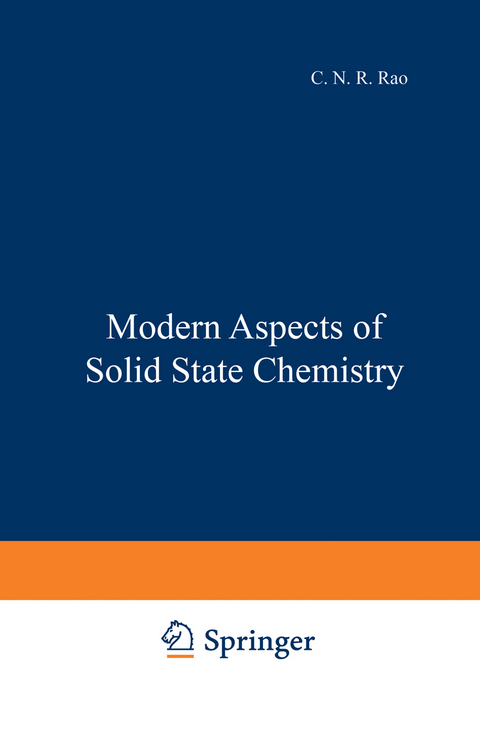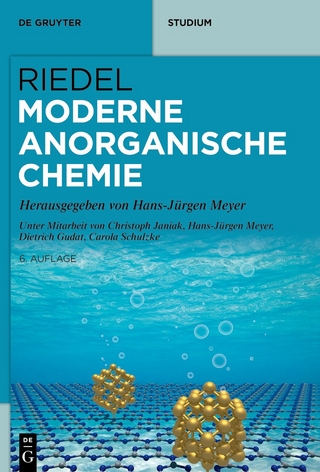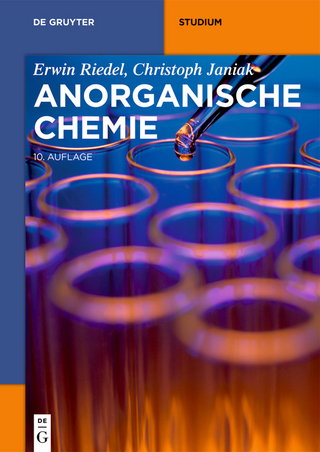
Modern Aspects of Solid State Chemistry
Springer-Verlag New York Inc.
978-1-4684-1877-4 (ISBN)
1. Lattice Dynamics.- Theory of Small Oscillations.- Effect of Lattice Symmetry.- Density of Vibrational States.- Vibrational Thermodynamic Properties of Crystals.- X-ray and Neutron Scattering.- 2. Cohesive Energies of Ionic Solids.- Born-Haber Cycle.- Born Treatment of Ionic Solids.- Some Related Aspects.- 3. Defect Chemistry and Non-Stoichiometric Compounds.- Point Defect Equilibria in Crystals.- The Systematica of Non-Stoichiometric Compounds.- Grossly Non-Stoichiometric Compounds.- Ferrous Oxide: A Case History.- Strong Defect Ordering: Intermediate Superstructure Phases.- Elimination of Defects: Crystallo graphic Shear.- Imperfections of Ordered Structures (Lattice Imaging).- Conclusions and Outstanding Problems.- 4. Theory of Point Defects in Ionic Crystals.- to Point Defects in Ionic Crystals.- Experimental Studies of Point Defects.- Theoretical Calculations of the Formation Energies of Schottky Defects.- Defect Interaction Energies.- Migration Energies.- Interstitial Defects.- Concluding Remarks.- 5. Dielectric Properties.- Definitions and Units.- Mechanisms of Polarization.- Alternating Current Phenomena.- Ferroelectrics.- 6. Magnetism.- Non-Interacting Atoms.- Magnetic Interactions.- Long-Range Order.- Spiral Configurations.- Magnetic Atoms in a Crystal.- Superexchange Interactions.- Collective d-Electron Model.- 7. Neutron Diffraction and Solid State Properties.- Thermal Neutrons.- Elastic Scattering.- Inelastic Scattering.- Conclusions.- 8. Magnetic Resonance.- Nuclear Moments end Nuclear Magnetic Resonance.- Spin-Lattice Relaxation.- Bloch Equations and Transverse Relaxation.- Experimental Arrangements.- NMR in Non-metallic Solids.- Quadrupolar Splittings in NMR.- NMR in Metals.- Chemical Shift and Spin Coupling in Solids.- Pure Quadrupole Resonance in Solids.- Electron Paramagnetic Resonance.- Concluding Remarks.- 9. Nuclear Magnetic Resonance in Superconductors and Dilute Alloys.- NMR in Superconductors.- NMR in Dilute Alloys.- 10. Magnetostriction in Materials.- Behaviour of Common Materials.- Conclusions.- 11. Mössbauer Effect and Dynamics of Atomic Motion in Solids.- Resonance Fluorescence.- Mossbauer’s Experiment.- Resonance Absorption of Gamma Rays and Dynamics of Atomic Motion.- Experimental Results.- Concluding Remarks.- 12. Positron Annihilation in Solids.- Methods and Results.- 13. Elements of Order-Disorder Theory and Diverse Applications.- Statement of the Problem.- The Zero Order Approximation (Langmuir Isotherm).- The Fermi-Dirac Distribution Function.- Decomposition of the Lattice into Subfigures.- The Fowler-Guggenheim Adsorption Isotherm.- Thermodynamic Properties of Binary Mixtures in the Bragg-Williams Approximation.- 14. Diffusion in Solids.- The Diffusion Coefficient.- Intrinsic Diffusion Coefficients.- Self-Diffusion Coefficients.- Experimental Procedures.- 15. Ionic Conductivity.- Conduction Mechanisms in Ionic Crystals.- Anisotropy of Conduction in Ionic Crystals.- 16. Inorganic Glasses.- Constitution of Glass.- Glass formation.- Inorganic Glass Forming Systems.- Transport Properties of Glasses.- 17. Electrical Properties of Solid Catalysts.- Historical Introduction.- Classification of Solid Catalysts based on Electronic Properties.- Inverse Mixed Catalysts.- Conclusions.- 18. Dislocations and Solid State Reactions.- Dislocations, Their Structure and Properties.- The Role of Dislocations in Chemical Reactions.- 19. Solid State Reactions.- Role of Defects in the Reactivity of Solids.- Solid-Gas Reactions: Oxidation of Metals.- Solid-Solid Reactions.- Thermal Decomposition of Solids.- 20. Bandand Transport Theories in Solids.- to Band Structure Concepts (Particle-in-the-Box).- Kronig-Penney Model.- Bloch Functions for the Circular Chain.- Band Structure for a Circular Chain in the Tight Binding Approximation.- Pauli Exclusion Principle and Fermi-Dirac Statistics.- Heat Capacity of a Metal.- Classification of Materials.- Elementary Discussion of Yarious Transport Phenomena.- Fermi Levels and Conductivity in Intrinsic and Extrinsic Semiconductors.- Transport Effects in Materials Characterized by ‘Hopping’ Electrons.- Brief Survey of Experimental Results.- 21. Spectroscopy of Metals and Semiconductors.- Macroscopic Theory and Experimental Methods.- Microscopic Theory of Optical Properties.- Optical Properties of Metals.- Optical Properties of Semiconductors.- Conclusions.- 22. Phase Transformations in Solids.- Thermodynamic Considerations.- Structural Changes in Transformations.- Kinetics of Transformations.- Order-Disorder Transitions.- Martensite Transformations.- Ferroelectric Transformations.- Magnetic Transitions.- Semiconductor-Metal Transitions.- High Pressure Transformations.- Born Treatment of Phase Transformations in Alkali Halides.- Comments on Experimental Techniques.
| Zusatzinfo | XIV, 626 p. |
|---|---|
| Verlagsort | New York, NY |
| Sprache | englisch |
| Maße | 178 x 254 mm |
| Themenwelt | Schulbuch / Wörterbuch |
| Naturwissenschaften ► Chemie ► Anorganische Chemie | |
| Naturwissenschaften ► Chemie ► Physikalische Chemie | |
| Sozialwissenschaften | |
| ISBN-10 | 1-4684-1877-7 / 1468418777 |
| ISBN-13 | 978-1-4684-1877-4 / 9781468418774 |
| Zustand | Neuware |
| Haben Sie eine Frage zum Produkt? |
aus dem Bereich


